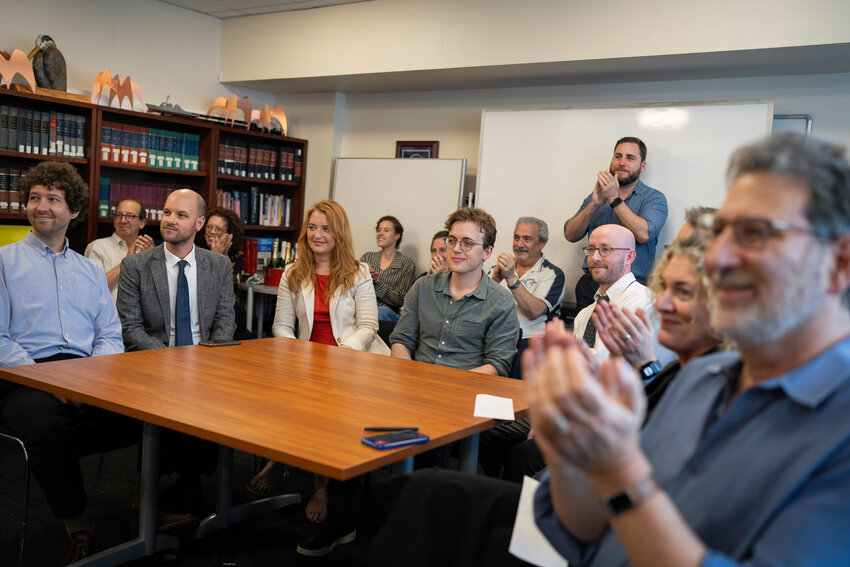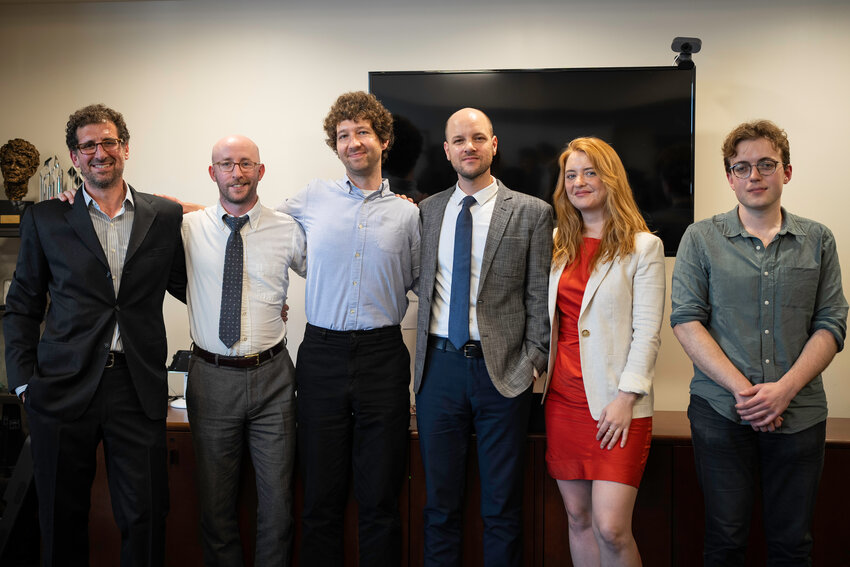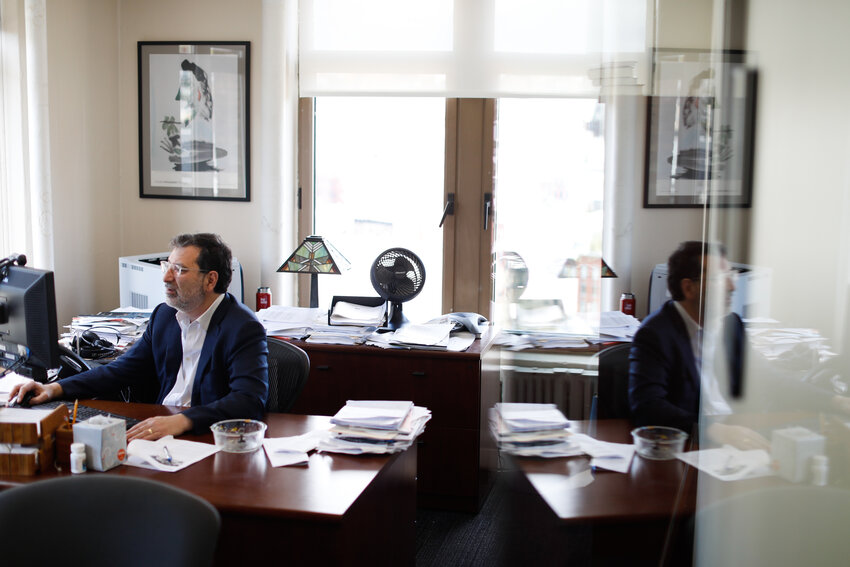This year, ProPublica added another Pulitzer Prize — its seventh — to its impressive and long list of journalism awards. In the “Friends of the Court” series, ProPublica reporters Kirsten Berg, Justin Elliott, Joshua Kaplan, Alex Mierjeski and Brett Murphy revealed ethical breaches at the U.S. Supreme Court, including particularly generous gifts to Justice Clarence Thomas from billionaire pal Harlan Crow. It was the kind of story ProPublica has become known for — tenacious, meticulous, probing, bold and vital.
A model for nonprofit accountability journalism, ProPublica is approaching its 20th anniversary in 2027. In 2007, the Sandler Foundation provided initial seed money to start the 501(c)(3) in New York City. In the years since, ProPublica caught the attention of other philanthropic organizations eager to fund the venture — the Carnegie Corporation, Ford Foundation, Knight Foundation, MacArthur Foundation and Pew Charitable Trusts. The website has a “Supporters” page that lists all major donors, and they gratefully receive small-donor support, as well — roughly a quarter of the revenue, according to Editor-in-Chief Stephen Engelberg.
A leap of faith
Stephen Engelberg and Charles Ornstein joined the ProPublica newsroom in 2008 when it still felt very much like a “startup.” E&P spoke with the editors — Engelberg, now the editor-in-chief and Ornstein, now managing editor, local — about those fledgling early days, its mission and culture, and how ProPublica has evolved, especially in recent years.
In 2007, Engelberg was the managing editor at The Oregonian. He recalled feeling like he was “staring into the abyss.” He could feel the business model faltering. Newsrooms around the country were being pared down. He said that working in the newsroom at that time felt like being on a treadmill. There was a constant demand for content and clicks and a presumption that volume — lots of content and audience — equaled revenue. When he decided to make a career change and relocate his family from Oregon to New Jersey, he discovered the opposite was true.

“If you wrote a story with impact, you could raise more money,” he said. Of course, that wasn’t immediately clear. Engelberg recounted his first day at ProPublica in 2008.
“We walked into the room on Broadway, with just carpet, no furniture and a phone on the floor,” he recalled.
Engelberg’s first task was to staff the newsroom; he recalled receiving 1,100 applications — not all of them qualified, not all of them journalists. He remembered one, in particular — a retired FBI agent who had no journalism experience but said he knew how to find things out. Instead, the leadership team sought more experienced and award-winning talent to move to New York City and stake their careers on ProPublica’s proposition.

Back then, there were few nonprofit news outlets outside of public media. Today, he marvels at the accessibility of free, high-quality journalism “that makes a splash and gets readers in the millions.”
ProPublica’s model has been so successful that it has enabled the organization to create a generous rather than isolated and proprietary culture.
“This sort of notion of sharing things, teaching and seeing impact beyond our newsroom is in our DNA,” Engelberg said.
ProPublica has offered an investigative editor training program for two years and counting. It’s a yearlong training opportunity for 10 news editors, including editors from underrepresented backgrounds and communities. The first-year cohort was chosen from 159 applicants.

As editor-in-chief, Engelberg thinks a lot about the public’s eroding trust in news sources. Producing good journalism and being transparent about it are the best two tools we have to repair it, he suggested. He walked E&P through the origin story of the Pulitzer-winning “Friends of the Court” series. As a newsroom, they’d taken notice of how democratic institutions have been under attack, particularly since the Trump Administration. That led them to consider judiciaries, and they thought they might begin with some investigations into state and appellate courts. But during that process, it became clear that there was a story the American people needed to know, coming from the halls of the highest court in the land.
When you’re producing investigations about wealthy, well-connected and powerful people — a billionaire, a former president, or even a Supreme Court Justice — the threat of legal retribution is a constant concern. Engelberg is cognizant that “lawfare” is becoming an easy tactic for petitioners to drag the press into protracted and expensive lawsuits. To mitigate the risk, every ProPublica story and every press release gets the scrutiny of their lawyers.
“That standard of nervousness or care is unusual but pretty darn necessary,” he said.

ProPublica’s team has grown to more than 150 employees today. The budget has also increased.
“One thing that has not changed is the mission, which was written in year one. The idea was to do investigative journalism that would spur change and have real world impact,” Engelberg said. “To that, we have remained focused.”
Within 24 hours of the 2024 Pulitzer announcement, Engelberg learned that he had received the 2024 Freedom of the Press Career Achievement Award from the Reporters Committee for Freedom of the Press.
Picking partners
Before joining ProPublica's newsroom in 2008, Ornstein already had an award-winning career in his wake. He’d come from large metro dailies, such as The Dallas Morning News and the Los Angeles Times. While at the Los Angeles Times, he partnered with Tracy Weber on an investigative series. Then, Sam Zell owned the paper. Ornstein said the newsroom's morale was at a low point, mainly because the owner didn’t seem to share their values. He and Weber decided to put their faith in a future at ProPublica. Weber is now the managing editor.
“At the time, it felt like a risky step to leave an established news organization and go to work for this startup. Obviously, in hindsight, that proved to be a really smart move. The opportunities, the time, the resources to pursue good journalism — the intelligence and ingenuity of the editors and staff — was present from the beginning,” Ornstein recalled.
The newsroom has grown exponentially and changed in measurable ways. For example, they’ve added an engagement team.
“We also have a new type of news applications team that takes really complex data sets and makes them accessible, so people can gain insight into how the things we’re writing about affect their lives, their communities, their doctors, schools, hospitals, and so forth,” Ornstein said. “The ability to customize our journalism to tell your own story is something that’s been really important to us. … And then we’ve increased the size of what we call our ‘specialty teams,’ which are the teams that work hand-in-hand with our reporters to create big, ambitious projects.”
When asked about the challenges ProPublica faces today, Ornstein said they’re not entirely different from those any newsroom contends with — like diminished trust in news.
“A significant part of the public doesn't feel the media speaks for them or to them. We have to be mindful of that,” he said.
Platform preferences have created opportunity, but also complicate matters. ProPublica has to be “multi-tactical” in its reporting, leveraging the web, newsletters, social channels, video streaming — all of it.
Ornstein’s title — managing editor, local — reflects how ProPublica has evolved in another key way. With the 2018 launch of the Local Reporting Network, ProPublica is not only producing impactful journalism, it’s fortifying local newsrooms across the country through reporting partnerships.
The website has a full list of past and current partners. They represent a spectrum of newsrooms, from other nonprofits to some of the nation’s largest media companies. A recent collaboration with The New York Times produced a report on the IRS’s audit of former President Donald J. Trump and an accounting misdeed related to one of his properties in Chicago.
This past May, ProPublica announced a sweeping partnership with Scripps News to produce investigative reporting that will appear on both Scripps News brands and ProPublica’s digital platforms. According to the press release, “Scripps News will also feature ProPublica reporters on local and national programming regularly to highlight the organization’s original reporting.”
ProPublica receives far more partnership proposals than it can manage, so an application and adjudication process is in place. Ornstein said they look for more than just a good story idea. They want to partner with experienced journalists who’ve worked in long form.
“We want to see cultural competency and community competency. We want to see the news organization is committed to telling the story. … We really want to make sure there's a real reason to tell this story in this place. There are many topics and subjects that could be told from anywhere in the country, but we want to know why we should tell the story from your community,” Ornstein explained.
In April 2024, ProPublica announced its 50-State Initiative — “a commitment to publishing accountability journalism in every state over the next five years.”
“We’ve recognized that there’s a need for accountability journalism everywhere across the country. We feel great that in our first six years, we've reached more than half the states, but there are more places to go, and we want to reach the places we’ve already been. It’s a bold vision to produce accountability journalism all across the country; it feels like a really important thing to do, both for ProPublica and for the local news ecosystem,” Ornstein said.
By January 2025, ProPublica will have a “sustainability desk” in place. This desk will work with former partners and facilitate resource sharing so that the local newsrooms can continue to do investigative work.
“Many news organizations have an investigative reporter but don’t have a data team, a research team or an engagement team. Having those resources to help them may enable them to keep the excitement about doing investigative journalism and practically help them do it,” he said.
Impact isn’t always predictable, and sometimes it doesn’t manifest until years later, but impact is the mission at ProPublica.
On its website, ProPublica has a page dedicated to tracking impact.
“What’s been unbelievable is to see the tangible impact that's been produced, like the $2 billion the Idaho legislature approved to fix their crumbling schools. That was done in direct response to our work with the Idaho Statesman. There was the $600 million that Hawaii’s legislature dedicated to fixing problems with their native Hawaiian homesteading program, which was a direct result of our work with the Honolulu Star-Advertiser.”
 Gretchen A. Peck is a contributing editor to Editor & Publisher. She's reported for E&P since 2010 and welcomes comments at gretchenapeck@gmail.com.
Gretchen A. Peck is a contributing editor to Editor & Publisher. She's reported for E&P since 2010 and welcomes comments at gretchenapeck@gmail.com.
Comments
No comments on this item Please log in to comment by clicking here